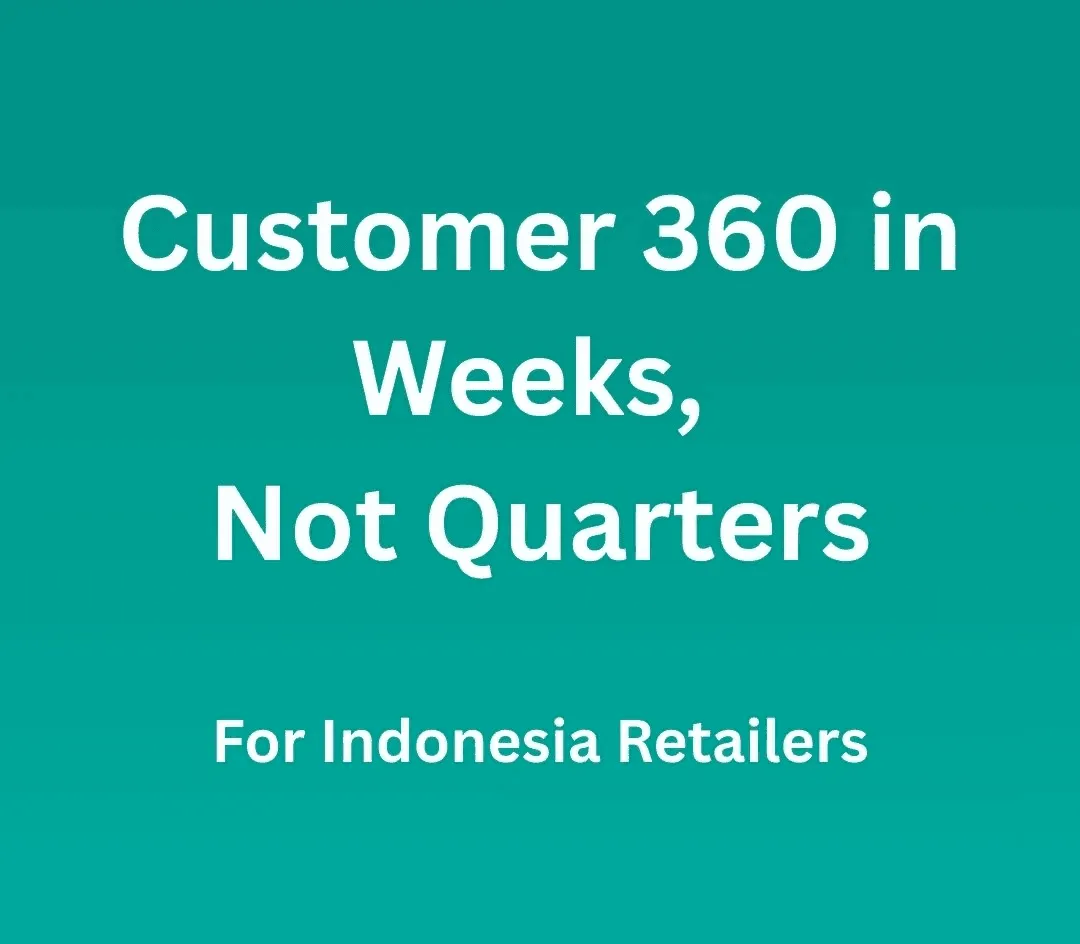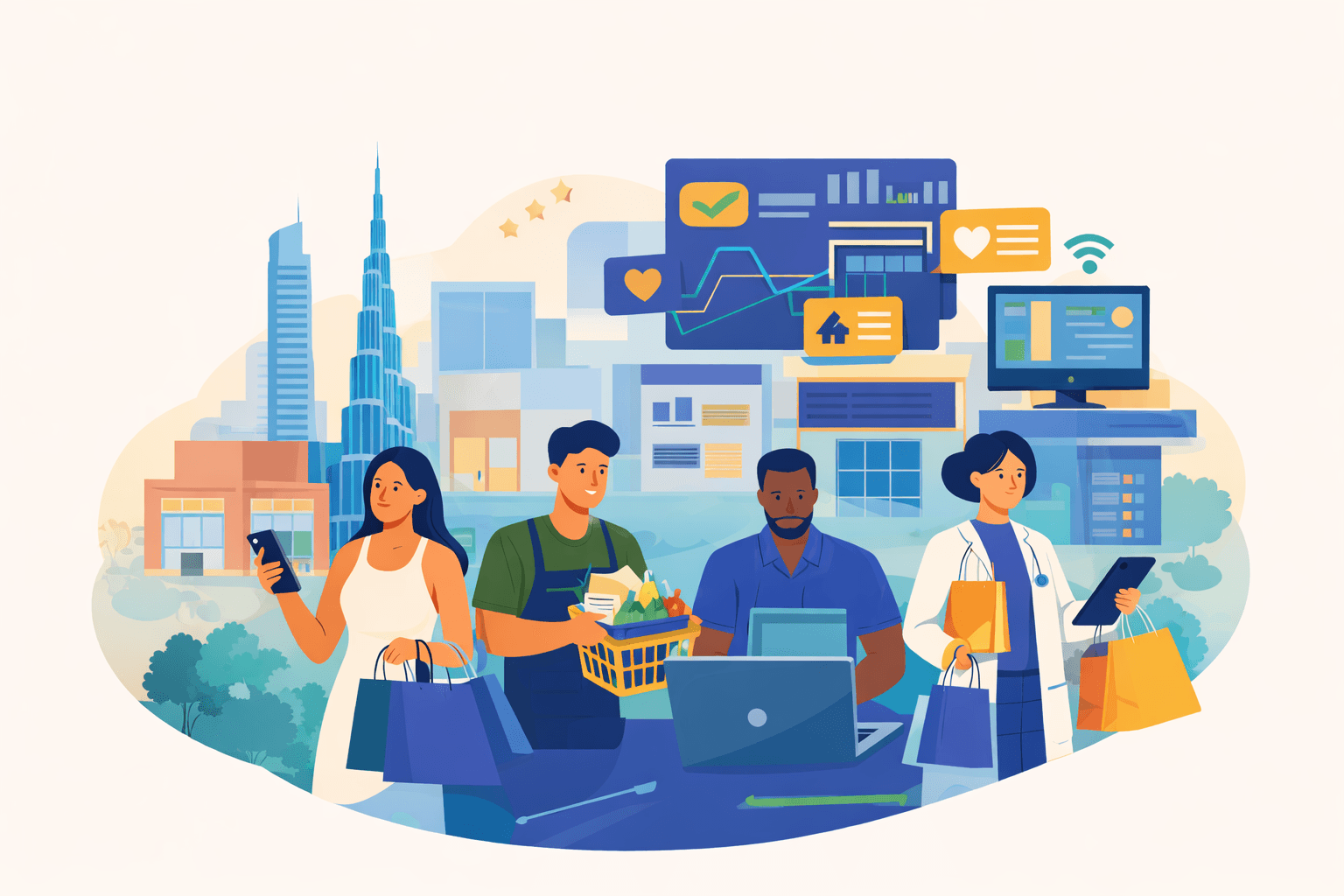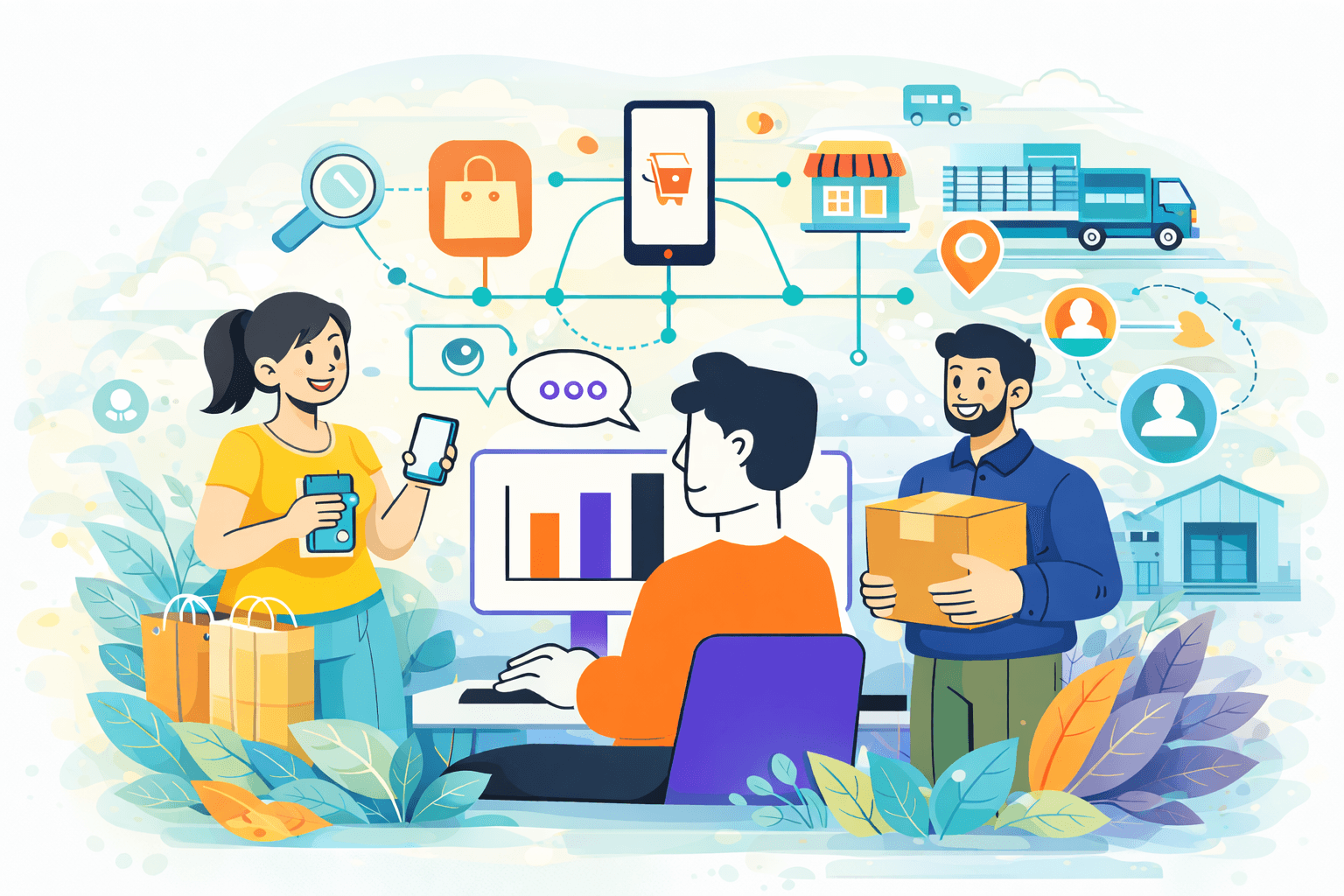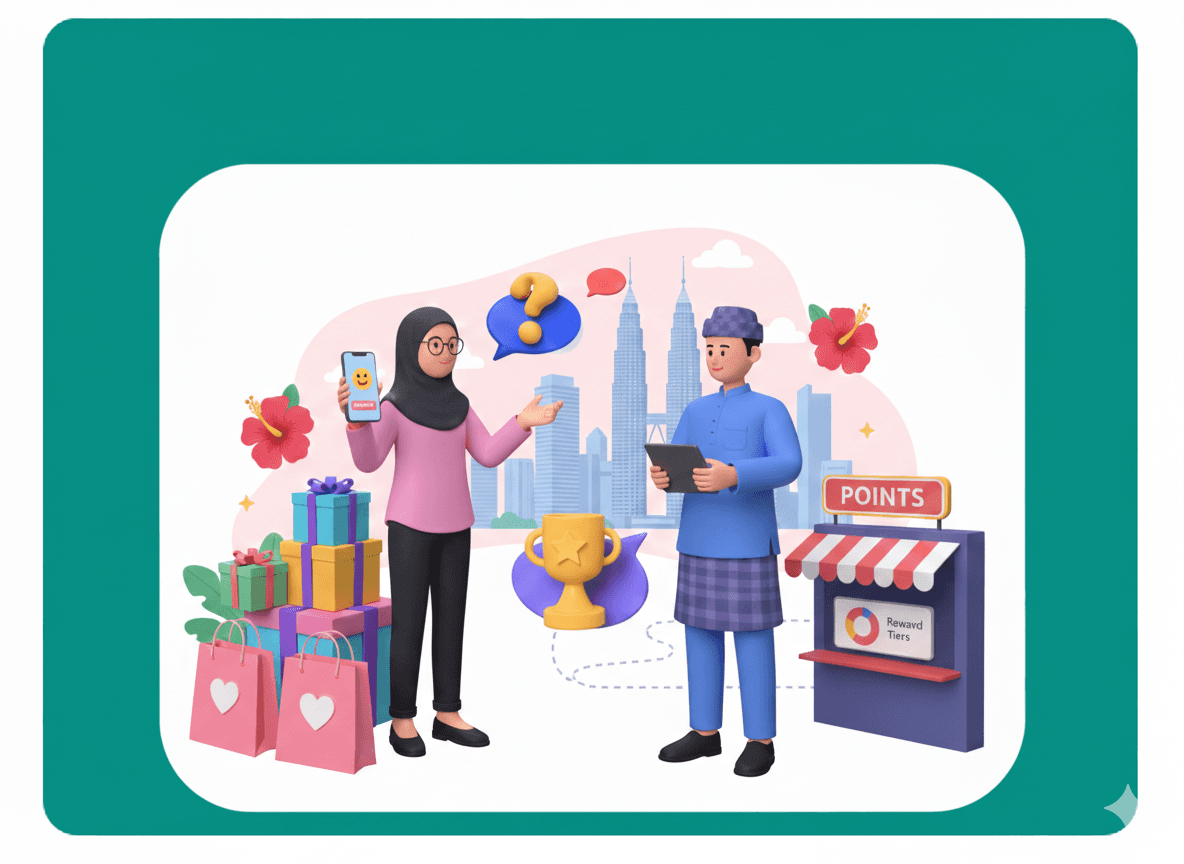Customer 360 in Weeks, Not Quarters: The Fast-Track Strategy for Indonesian Retailers
Sep 1, 2025

In Indonesia’s fiercely competitive retail market, where loyalty is fleeting, and digital touchpoints multiply by the day, gaining a true, 360-degree view of your customer is no longer a long-term ambition.
It’s an urgent need.
And yet, for many retailers across Jakarta, Surabaya, Bandung, and beyond, the journey to "Customer 360" feels like an expensive, never-ending project, marked by complex integrations, lengthy vendor timelines, and data trapped in silos.
But here’s the good news: It doesn’t have to be this way anymore.
With the right architecture and a modern approach, Indonesian retailers can unify customer data from POS, e-commerce, ERP, and CX systems in weeks, not quarters. No massive re-platforming. No multi-year digital transformation roadmaps. Just clean, unified customer profiles that drive results fast.
Why "Customer 360" Still Feels Out of Reach for Indonesian Retailers
The problem isn’t ambition-it’s architecture.
Retailers in Indonesia are collecting data from more sources than ever:
POS data from physical stores in different localities
E-commerce data from Tokopedia or Shopee storefronts
ERP systems tracking backend inventory and sales
Customer service logs from WhatsApp or call centers
Loyalty program activity
Promo engagement from in-store and digital channels
But stitching this into a single customer profile? That’s where it breaks down.
Often, each system was implemented independently. One may store "First Name" as "FName", another calls it "Given Name". One tracks phone numbers with the "+62" country code, another strips it. And most still treat email, phone, and loyalty ID as separate customer identities-leading to duplication, fragmentation, and chaos.
The result? Disconnected campaigns, wasted budgets, and a fragmented customer experience that loses revenue.
A New Playbook: Customer 360 in Weeks, Not Quarters
The smarter path isn’t to overhaul all systems-it’s to intelligently unify what already exists.
Here’s how modern Indonesian retailers can do this in three clear steps:
1. Stitch POS, E-Com, ERP & CX into One Profile (Unify + Dedupe)
Instead of migrating your entire tech stack, use lightweight connectors to ingest data from your POS, e-commerce platform, ERP, and customer service tools.
Think of this as building a “customer brain” above your existing systems-one that maps all touchpoints to the same individual.
Key here is identity resolution:
Match records across phone numbers, emails, loyalty IDs, and even device IDs
Use fuzzy logic to correct spelling errors and duplicates
Maintain a single, evolving “golden profile” per customer
This means whether a customer shops in-store at Ranch Market, browses your website, or chats with an agent via WhatsApp, they’re seen as one person, not five.
For example, a leading homeware retailer in Indonesia unified over 7 million customer records across online and offline systems using this approach, reducing duplicate records by over 35% and driving targeted campaigns with far more precision.
2. Standardize Attributes & Append External Data Where Useful
Once you’ve unified the profiles, the next step is to standardize customer attributes.
This sounds boring-but it’s where the magic starts.
You need consistent definitions for:
Gender
Date of birth
Address (standardized by province/city/kecamatan)
Preferred language
Shopping frequency
Channel affinity
Purchase value bands
Standardization enables analytics. Without it, segmentation becomes guesswork.
Then, enrich these profiles with external data-for example:
Telco scorecards or demographic enrichments
Location-based behavior patterns (urban vs semi-urban shoppers)
Purchase power indices
Household indicators (e.g., married, parents, students)
This gives you a sharper view of who your customer really is-not just what they bought last Tuesday.
A fashion retailer in Jakarta appended third-party demographic tags to their customer base and discovered that their top-performing cohort was not young urban professionals (as they had assumed), but instead mid-30s parents in tier-2 cities. That insight flipped their entire campaign strategy-and doubled retention in two quarters.
3. Activate to Email, WhatsApp & App via APIs-No Rebuilds Per Channel
Here’s where most CDP (Customer Data Platform) projects get stuck: activation. After spending months building beautiful dashboards, brands hit a wall when trying to use that data in real time. They end up doing separate data exports for:
WhatsApp campaigns
App push notifications
Email newsletters
Loyalty messaging
It’s inefficient. Worse, it’s delayed.
A modern activation approach fixes this by pushing profile segments directly into your channels via API.
You don’t need to rebuild templates. You don’t need to re-upload CSVs. Just define the logic once ("High-spending but churn-risk customers in Semarang"), and send that segment to your campaign platform in seconds.
One leading Indonesian convenience store chain connected their unified customer layer to their WhatsApp Business API, and within two weeks, began running real-time alerts for lapsed shoppers with personalized offers-leading to a 4.2x uplift in redemption compared to broadcast messages.
That’s the kind of agility retailers need-not next year, but now.
Why This Matters in the Indonesian Context
Indonesia is not a cookie-cutter market.
Retail formats are diverse: from modern trade hypermarkets in urban malls to traditional toko chains in tier-3 towns.
Customer behavior varies widely across regions, age groups, and digital adoption curves. And most shoppers toggle between in-store and digital experiences-expecting continuity and relevance across both.
In this environment:
A loyalty program without unified data becomes a liability
A promo campaign without deduped customer profiles bleeds budget
A WhatsApp message to the wrong customer risks churn
Retailers who act fast-and get Customer 360 right-will have a lasting edge. Those who delay will be outpaced by digital-native challengers and sharper incumbents.
Common Myths to Avoid
Myth 1: We need to finish our ERP overhaul first.
Reality: You can unify customer data around your ERP-not after replacing it.
Myth 2: It takes 6-12 months to build a Customer 360.
Reality: With modular platforms and APIs, you can go live with a clean unified view in 4-6 weeks, even with legacy systems.
Myth 3: We’ll need to hire a large data science team.
Reality: You need a lean data ops team and a platform that abstracts the complexity.
From Weeks to Wins: The ROI of Customer 360
Let’s talk outcomes. What can retailers expect when they go from scattered to unified?
📈 20-30% improvement in campaign conversion
🛒 15% higher repeat purchases
📉 25% drop in misfired offers
📊 Faster insights for merchandising and assortment decisions
📬 Reduced cost per engagement across WA, SMS, and app
In short: you make more money, waste less, and serve your customers better.
The Bottom Line
Indonesian retailers no longer have the luxury of time when it comes to understanding their customers.
The market is moving fast. E-commerce giants are deploying AI at scale. Shoppers expect personalization on every channel. And margins are under pressure from rising costs and price-sensitive consumers.
Customer 360 is your foundation-not a future goal.
So, if your current roadmap says 9-12 months, tear it up. With the right architecture, the right partners, and the right urgency, you can build a unified, intelligent customer layer in weeks.
And from there, every campaign, product decision, and experience only gets smarter.
Ready to unify your customer data and go live in weeks?
Get in touch with us at Loyalytics to learn how Indonesian retailers are accelerating their Customer 360 journey-with no system rebuilds, no long timelines, and no guesswork.
Related Blogs
Personalization in Retail: The Complete Guide for Modern Retailers in the UAE
Generic retail marketing no longer works in the UAE. Data-driven personalization is essential for engagement, retention, and growth.
Feb 20, 2026
Omnichannel Retail in Malaysia: A Strategic Blueprint for Growth-Driven Retailers
Learn how Malaysian retailers can build a scalable omnichannel strategy to increase revenue, retention, and operational efficiency.
Feb 19, 2026
The Ultimate Guide to Customer Loyalty Programs in Malaysia
Learn how customer loyalty programs in Malaysia drive retention, increase sales, and turn first-party data into measurable retail growth.
Feb 19, 2026





